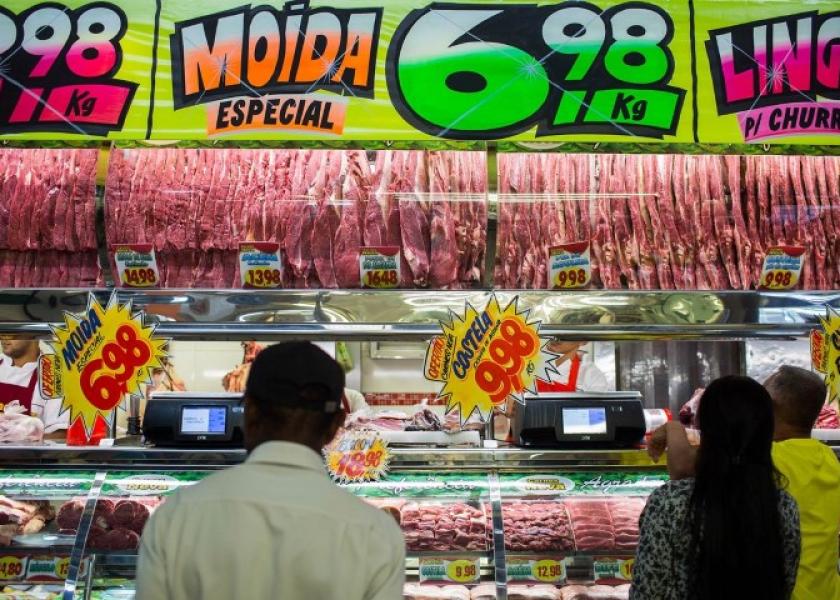Meat Giants Rush to Reassure Brazilians Amid Latest Scandal

Food giants JBS SA and BRF SA took out full-page newspaper ads and paid for prime-time television spots to reassure consumers their meat is safe to eat after finding themselves at the center of Brazil’s latest corruption probe.
Both companies saw their share prices tumble for a second day after federal authorities announced March 17 they’re investigating evidence producers bribed government officials to approve the sale of spoiled meat. China and South Korea temporarily suspended some imports of Brazilian meat and the European Union said it was monitoring the situation.
Brazilian prosecutors allege some sausages and cold cuts contained animal parts such as pig heads, that some meat products were adulterated with cardboard, and that in some cases acid was used mask the smell of tainted meat.
Since March 17, when federal authorities announced they’re investigating evidence that producers bribed government officials to approve the sale and export of soiled meat, both companies went into damage-control mode. The strategy includes spots on prime-time television and full-page ads in newspapers to say they have never sold rotten meat and that their products are perfectly safe to eat, denying allegations from the investigating judge that cardboard and acid have been added to some Brazilian meat.
‘Twitter Account’
The scandal is threatening to undermine years of extensive publicity focused on the quality and safety of their products, which starred celebrities including British chef Jamie Oliver and two-time Oscar-winner Robert de Niro. The two companies invested a combined 1.2 billion reais ($386 million) in the first half of 2016 in advertising, according to the latest data from Kantar Ibope Media, a media research company.
"Considering the gravity of the accusations, they should have been faster and more precise to avoid bigger image damages," Pedro de Camargo Neto, a foreign trade expert and former industry leader, said by phone.
JBS, the world’s largest meat producer, said in an ad broadcast Saturday night on Brazil’s largest TV network that the judge’s ruling on the so-called Weak Flesh probe had no mention of quality irregularities involving the company and that the "unfortunate" cases cited by the media do not involve any of its brands. The printed version of that ad -- which has been plastered across newspapers, in addition to the daily ones featuring a juicy steak and a smiling Brazilian actor -- is also the first result that comes up in Google searches for the company’s name. JBS even reactivated its Twitter account, last used in 2015.
‘Our Children’
BRF is focusing on family. Its TV spot, which also aired on prime time on the Globo channel, showed photos shared by employees on social media with their freezers filled with BRF products, saying "the food you are consuming in your home is the same food we’re consuming with our children." The print version on newspapers closes with "we only produce the food we put on our family’s tables" in big, bold letters.
JBS has for years promoted its fresh beef brand Friboi through a widely popular campaign highlighting the company’s meat is "100 percent inspected" and a "synonym for confidence." Last year, its chicken and processed food unit Seara hired Alex Atala, owner and head chef at Sao Paulo’s two-Michelin star restaurant D.O.M. as a star in a commercial. Also in 2016, BRF launched a new line of low-sodium, animal welfare-certified food branded by U.K. celebrity chef Jamie Oliver.
Now, the companies are rushing to fight back on public perception that their food is all but safe. It’s alleged that some of the meat, including sausages and cold cuts, was adulterated with ingredients including pig heads, and that suspect smells were masked by applying higher-than-permitted amounts of acid. Wrongdoings would also include repackaging of expired products and the export of cargoes tainted with salmonella. Not all the companies being investigated -- more than 30 -- committed all the alleged faults, the judge responsible for overseeing the investigation said in a court order.
Steak Dinner
The government is also trying to diminish the impact the scandal could have on the ailing economy -- Brazil is the world’s largest beef and chicken exporter, accounting for almost a fifth of global exports. President Michel Temer took ambassadors from the main importer countries to an all-you-can-eat steak dinner Sunday to prove local meat is safe to eat. China, whose diplomat sat beside Temer in the outing, is said to already have temporarily suspended imports.
The biggest newspapers ran pictures of the dinner on the front page Monday, after a weekend full of social media frenzy around the scandal. Pictures with pieces of cardboard on meat skewers, as well as versions of JBS ads with irony-filled subtitles flooded Twitter -- including responses to the company’s own post about food safety.
Both companies deny irregularities. On Friday, JBS said it "vehemently repudiates" claims it sold spoiled food, while BRF said it abides by all regulations and that it’s cooperating with authorities. In a separate statement, BRF said the salmonella strain present in some chicken shipments to Europe is allowed by European Union legislation and called the accusation it mixed cardboard to meat a "big misunderstanding" by the police.
JBS shares closed up 0.8 percent after falling as much as 10 percent in Sao Paulo. BRF closed down 2.2 percent, Minerva SA 7.4 percent and Marfrig Global Foods SA 4.3 percent.
While it’s too early to quantify the potential implications for JBS and BRF, a quick share-price recovery is unlikely given the new layer of risk, JPMorgan Chase & Co. analysts Pedro Leduc and Ian Luketic said in a report. Any loss of sanitary certification could result in production shutdowns, product recalls and export bans, they said.
©2017 Bloomberg L.P.







